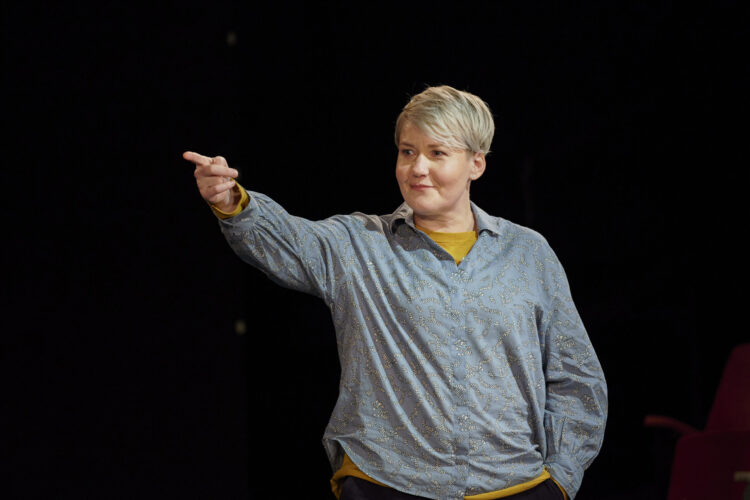
Enter the round in the Abbey’s Peacock Theatre to a warm greeting from leading actor Amy Conroy. Upon arrival, audience members are given a postcard, carrying a number and a “brilliant thing” which, when indicated, must be called out “as loud as possible.” This is one of the many ways in which the audience is encouraged to participate in this playful, buoyant production of Duncan Macmillan’s play. In this production directed by Andrea Ainsworth, Conroy oozes sincerity as she chronicles her unnamed character’s coming of age and understanding of depression and loss. She addresses audience members like old friends, and creates a safe, open environment for spectators to get involved, fulfil roles, and feel connected to a story about consequence, circumstances, and the unexpected turns life can take.
Ainsworth’s stripped-back approach allows Conroy’s warmth to radiate from the stage. With the house lights remaining bright for the entirety of the show, members of the audience are visible throughout, revealing the shared nature of this theatrical experience. During a particularly isolating and challenging period of the pandemic, the play injects a sense of community among spectators and performer alike, illuminating the way our lives and stories tessellate, and the joy that can be derived from the little things. The play comes to reckon with the common misconceptions and the reality of depression. Generational approaches to mental health, and the way in which language, and general understanding have progressed over the last twenty years, are presented frankly. Conroy compassionately conveys the confluence of grief and growth her character experiences as she comes to understand that a list made as a child of “the reasons to stay alive,” is not enough to alter her mother’s health. This is not to say that the character’s attempts are futile: Her childhood list of “brilliant things” grows with her into a source of positivity and unity between multiple figures in the woman’s life, causing a ripple effect greater than was initially intended.
At the heart of the play is a discussion about grief and acceptance. The audience are taken on an immersive, and often suspenseful, journey through adopted and inherited traits and objects, as Conroy’s character grapples with the impact her childhood had on her as an adult. Despite the sensitive subject matter, the story is communicated with grace and humour, facing its themes honestly and compassionately, while leaving room for joy. Conroy carefully balances darkness with light in her delivery, showing the importance of their coexistence, and the reality that life, even in the most difficult moments, is more than monochrome.
Costume and set design are pared back revealing the black-box walls of the Peacock space. This illusion of sparseness paves the way for a wealth of surprises. Pianos, puppets and proposals are found in unlikely places, and a unique energy propels the show forward as audience members are granted access to the direction of the narrative. Hiding in plain sight, and within the spectators themselves, lies the world of the play. This playground of possibilities is supported by a soulful score designed by Carl Kennedy, featuring the woman’s favourite records: Ray Charles, Nina Simone and Ella Fitzgerald.
Every Brilliant Thing promises to provide light and spontaneity with every performance. With its reliance on audience generosity and playfulness, it offers a unique performance every night, while Conroy’s infectious charm and compelling performance ensures that fun is certain to be had.
Every Brilliant Thing will be performed in the Peacock until January 22nd, before touring countrywide. See the Abbey website for details.






